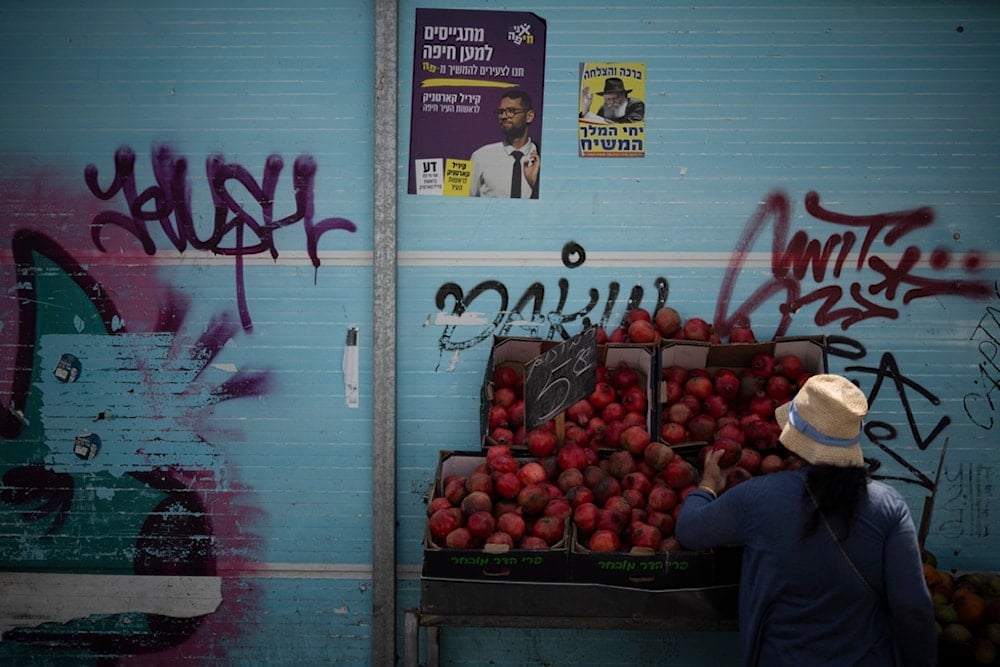Israeli economy stalls: 0.7% growth, 3.6% inflation, credit cut
Despite its efforts to maintain financial stability, "Israel’s" war economy is proving unsustainable.
-

A woman checks the pomegranates displayed at a street market in Haifa, occupied Palestine, Friday, Aug. 16, 2024. (AP)
The Jerusalem Post on Tuesday reported that "Israel's" economy continued to struggle in the second half of 2024, as its war on Gaza deepened financial instability and eroded investor confidence. According to the Bank of Israel's latest financial stability report, macroeconomic risks remain high despite minor improvements in credit and asset pricing.
The central bank's risk assessment, which evaluates the exposure of "Israel's" financial system to macroeconomic challenges, found that economic instability persisted due to the security situation. The report pointed to the war's impact on global perceptions of "Israel's" economy, affecting businesses, government finances, and borrowing costs. The observations are in line with projections from the International Monetary Fund (IMF), which recently revised "Israel's" 2024 GDP growth forecast down to 0.7%, citing regional conflicts and heightened uncertainty as major concerns.
Despite a somewhat modest GDP growth following a contraction at the end of 2023, "Israel's" economy has yet to regain its expected trajectory. "The Composite State of the Economy Index, which indicates the level of economic activity, continued to be sluggish in October and November," the Bank of Israel stated, noting that economic conditions remain difficult. Meanwhile, the Organisation for Economic Co-operation and Development (OECD) predicts that "Israel's" GDP will grow by 2.4% in 2025 and 4.6% in 2026, largely driven by increased military expenditure and government demand.
The government's increased fundraising efforts and higher bond yields reflected investor concerns. Additionally, Moody's recently downgraded "Israel's" credit rating from A2 to Baa1, warning that the prolonged war could continue straining the economy.
Financial Market and Real Estate Trends
The risk level associated with asset prices fell from "high" to "moderately high" over the past six months. While Israeli stock indices have recovered in recent months, they remain lower compared to global markets, suggesting that investors still perceive elevated risk.
The real estate sector, however, continued to experience rising apartment prices, a trend that began earlier in the year. The credit market also showed stabilization, as late debt repayments remained historically low, leading to a downgrade in credit risk from high to moderately high.
Monetary Policy and Inflation
With inflation at 3.6% as of August 2024, exceeding the government's target of 1%-3%, the Bank of Israel has maintained its benchmark interest rate at 4.5% for the sixth consecutive meeting. The central bank has stressed the need to stabilize markets and reduce uncertainty while ensuring that monetary policy supports economic activity.
Key Risk Scenarios
The Bank of Israel outlined two major risks facing the economy:
- Escalating Security Concerns – The continuation of the war with Hamas and potential geopolitical deterioration could lead to: Increased security spending, workforce disruptions due to reserve call-ups, and growing international pressure affecting trade and investments.
- Global Economic Slowdown – De-globalization trends and sluggish global growth may further challenge "Israel's" economy. This aligns with concerns from JPMorgan, which recently cut its 2024 growth forecast for Israel from 1% to 0.5%, citing geopolitical instability and reduced investor confidence.
Labor Market and Sectoral Disruptions
The war has negatively impacted various sectors, particularly construction and agriculture, where workforce shortages have emerged due to the reduction in Palestinian and migrant labor. Efforts to mitigate these disruptions include incentivizing Israeli workers and increasing mechanization, but the impact remains significant.
Read more: 'Israel' taps into Indian workforce despite weak security conditions
Meanwhile, the high-tech sector, which has been a key driver of "Israel's" economy, is also experiencing labor shortages and a slowdown in investments, further complicating the economic outlook.
Overall, despite its efforts to maintain financial stability, "Israel’s" war economy is proving unsustainable. While its financial institutions remain operational, the broader economic structure is weakening under the weight of military aggression, diplomatic isolation, and growing opposition to its occupation policies.

 4 Min Read
4 Min Read










